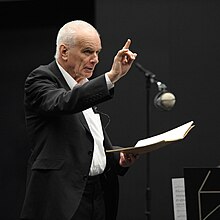Taverner (opera)
| Taverner | |
|---|---|
| Opera by Peter Maxwell Davies | |

The composer in 2012
|
|
| Librettist | Peter Maxwell Davies |
| Premiere | 12 July 1972 Royal Opera House, London |
Taverner is an opera with music and libretto by Peter Maxwell Davies. It is based on the life of the 16th-century English composer John Taverner, but in what Davies himself acknowledged was a non-realistic treatment. The gestation for the opera dated as far back as 1956 during Davies's years in Manchester, and continued when he went to Princeton University in 1962. Davies produced several instrumental works related to the opera during this gestation period, including the Points and Dances from 'Taverner' and the Second Fantasia on John Taverner's "In Nomine". Davies had completed the opera in 1968, but lost parts of the score in a fire at his Dorset cottage in 1969, which necessitated recomposition.
Davies uses Taverner's In Nomine as a musical motif in the composition. Stephen Arnold has written a detailed analysis of the music of the opera and of Davies's use of parody. The American composer John Harbison has published an analysis of the opera (working from the vocal score), contemporary with its first performances. Gabriel Josipovici has commented on the historical events that inspired the opera and on the libretto itself.
The opera was first performed at Covent Garden, London, on 12 July 1972, with Edward Downes conducting, Michael Geliot as director and Ralph Koltai as designer.
The US premiere was in March 1986 at the Opera Company of Boston, under the direction of Sarah Caldwell.
Scene 1
Taverner is put on trial before the White Abbot on charges of heresy. Testimony comes from his father and his mistress, as well as a priest and a choirboy. Taverner is found guilty, but the Cardinal pardons him, noting the composer's usefulness and naiveté.
Scene 2
Taverner's fate is mirrored in the chorus of monks as he ponders his conscience.
Scene 3
The King‡ discusses his intended divorce with the Cardinal‡‡, with interruptions from the jester.
Scene 4
The court jester proves to be Death in disguise. A metaphorical battle for Taverner's soul then occurs, with his father and mistress in opposition to the jester/Death. The jester/Death prevails, and Taverner has become a religious fanatic.
...
Wikipedia
